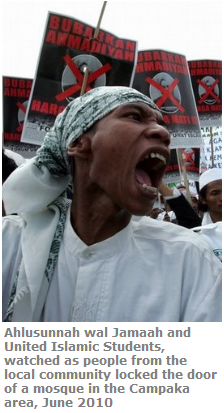Published: 21 March 2011
Region: Indonesia
 By Diani Panjaitan for the Jakarta Post
By Diani Panjaitan for the Jakarta Post

A friend called me last night to tell me of the mail bomb that hit Jakarta, one addressed to Indonesia’s leading liberal Muslim figure, Ulil Abshar Abdalla.
The attack on Ulil was not the first and I fear that it won’t be the last. For the past few months Indonesia has been under threat from extremist groups. I have no doubt that the threat is escalating and the terrorists’ main target is Indonesia’s diversity.
Before Ulil, there were attacks on Ahmadiyah followers, Christians and other minority groups. Three Ahmadis were brutally slain by a mob chanting “God is Great” in Cikeusik, Banten in February. There were even videos of the killings on the Internet.
Media involvement stopped at reporting on the violence and quoting officials. A few articles condemning the attacks were published in newspapers but such rhetoric was almost absent on television. Some media outlets even went so far as to portray Ahmadiyah as a villain for tarnishing the purity of Islamic teachings.
At times like this, the media, like a good friend, should tell the truth without sugarcoating and say that the attacks are acts of terrorism that must be condemned. There is no noble cause that can justify these horrible acts, not even religion.
If there was any good that came out of the mail bomb threats it was that the public could no longer doubt that the attacks constituted terrorism. There should be no more religious and political figures classifying violent attacks as mere religious differences as they constitute violations of basic human rights.
These terror attacks, combined with Internet filtering and the imprisonment of a famous Indonesian pop star on pornography charges due to pressure from conservative groups, will make it very easy for the world community to misunderstand Indonesia as a country that upholds sharia. But that couldn’t be further from the truth.
Indonesia is a country based on democracy. Although the majority of its population is Muslim, Islam in Indonesia has always demonstrated differences from Islam in the Middle East or South Asia. It has always been vibrant with diversity and syncretism with the local cultures. However the terror attacks may have blurred that diverse image and shed light on radicalism.
Indonesian Islam has yet to show its true face, which does not tolerate terrorism. With democracy and press freedom in their infancy, Indonesian media are still very shy in criticizing sensitive issues related to religion. In a predominantly Muslim country criticizing issues connected to Islam requires extra caution. But if Indonesia intends to preserve its democracy, it is imperative that it moves to protect its diversity. The media needs to take the lead in this area.
People have already initiated dialogue to have their voices heard. They have turned to the Internet: blogs, Facebook, Twitter and other online media. Many of them are Muslims who refuse to have terrorists define Islam or Indonesia.
But with severe digital divide and the fact that mainstream media is still the dominating channel for most Indonesians, voices that condemn violent acts are left unheard, muffled by the infamous acts of terrorism. Furthermore, with the increasing censorship and Internet filtering by the government, justified by anti-pornography proponents, there is no guarantee that the Internet discourse won’t soon vanish as well.
Indonesia’s mainstream media needs to take a step forward to remind and educate the people of their rights as citizens, specifically the freedom of religion and expression. It’s the media’s job to raise the concern of injustice. It’s also the media’s job to hold the government accountable for failing to protect those rights and reprimand the unjust.
It is time to call them out.
Click here to read the article on the Jakarta Post webpage
Diani Panjaitan is a Fulbright scholar currently studying media policy at New York University